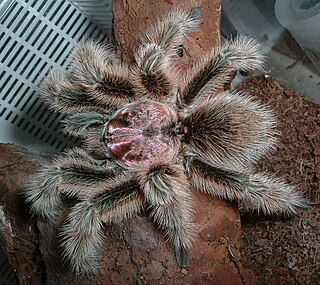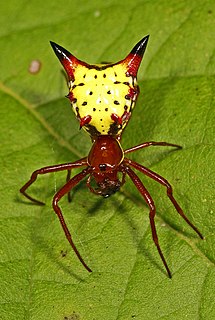
Grammostola is a genus of the tarantula family, Theraphosidae, being native to tropical South America.

Micrathena, known as spiny orbweavers, is a genus of orb-weaver spiders first described by Carl Jakob Sundevall in 1833. Micrathena contains more than a hundred species, most of them Neotropical woodland-dwelling species. The name is derived from the Greek "micro", meaning "small", and the goddess Athena.

Anelosimus is a cosmopolitan genus of cobweb spiders (Theridiidae), currently containing 74 species. Anelosimus is a key group in the study of sociality and its evolution in spiders. It contains species spanning the spectrum from solitary to highly social (quasisocial), with eight quasisocial species, far more than any other spider genus. Among these is the South American social species Anelosimus eximius, among the best studied social spider species.

Tarantulas comprise a group of large and often hairy spiders belonging to the family Theraphosidae. Currently, about 1,000 species have been identified. The term tarantula is usually used to describe members of the family Theraphosidae, although many other members of the same infraorder (Mygalomorphae) are commonly referred to as "tarantulas" or "false tarantulas". Some of the more common species have become popular in the exotic pet trade. New World species kept as pets have urticating hairs that can cause irritation to the skin, and in extreme cases, cause damage to the eyes.

Cryptachaea is a genus of spiders in the Theridiidae family.
Sanogasta is a genus of South American anyphaenid sac spiders first described by Cândido Firmino de Mello-Leitão in 1941.
Laminacauda is a genus of dwarf spiders that was first described by Alfred Frank Millidge in 1985.
Sickius is a genus of tarantulas. It has a single species, Sickius longibulbi. It is endemic to Brazil.
The Ischnocolinae are a subfamily of tarantulas. The composition of the subfamily was reviewed in 2014 and the number of genera included sharply reduced.
Catumiri chicaoi is a species of spider, in the Theraphosidae family. It is endemic to Brazil.

Chaetopelma is a genus of tarantulas that was first described by Anton Ausserer in 1871.
Ischnocolus is a genus of spider in the family Theraphosidae.

Metaltella is a genus of South American intertidal spiders first described by Cândido Firmino de Mello-Leitão in 1931. One species, Metaltella simoni, has been introduced to North America.
Tmesiphantes is a genus of spiders in the family Theraphosidae, subfamily Theraphosinae.
Trichopelma is a genus of South American and Caribbean tarantulas first described by Eugène Simon in 1888.

Polybetes is a genus of South American huntsman spiders that was first described by Eugène Louis Simon in 1897. It is a senior synonym of Leptosparassus and Streptaedoea.
Mesabolivar is a genus of cellar spiders that was first described by M. A. González-Sponga in 1998.
Sphecozone is a genus of sheet weavers that was first described by Octavius Pickard-Cambridge in 1871.

Arachosia is a genus of anyphaenid sac spiders that was first described by Octavius Pickard-Cambridge in 1882.








